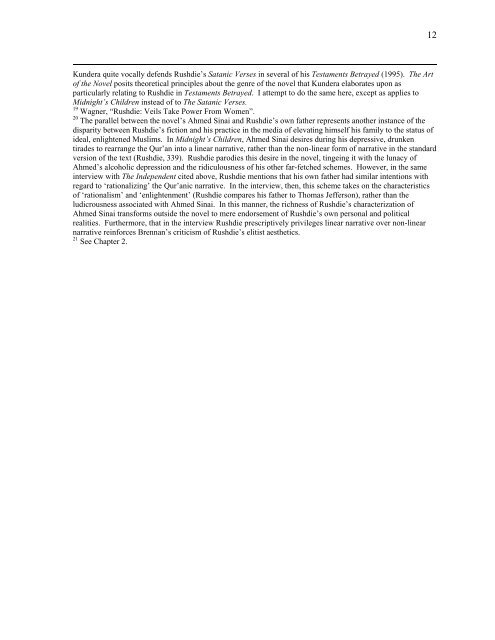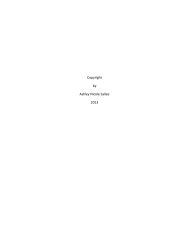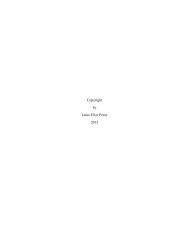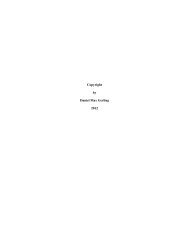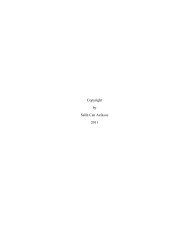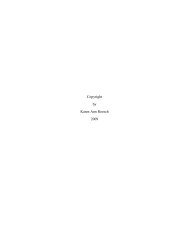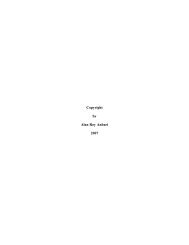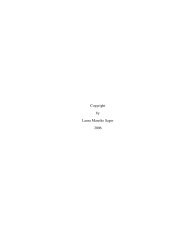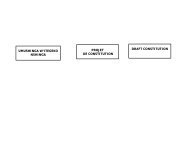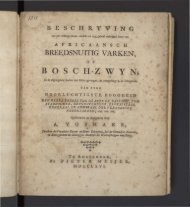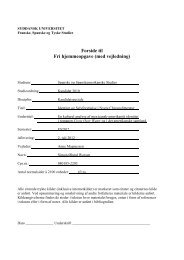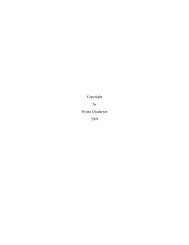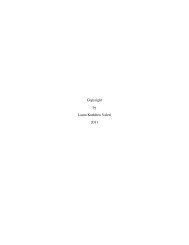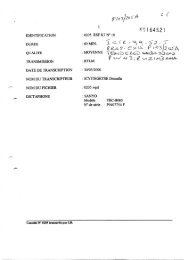The Secret Society: Descendants of Crypto-Jews in the San Antonio ...
The Secret Society: Descendants of Crypto-Jews in the San Antonio ...
The Secret Society: Descendants of Crypto-Jews in the San Antonio ...
Create successful ePaper yourself
Turn your PDF publications into a flip-book with our unique Google optimized e-Paper software.
Kundera quite vocally defends Rushdie’s Satanic Verses <strong>in</strong> several <strong>of</strong> his Testaments Betrayed (1995). <strong>The</strong> Art<br />
<strong>of</strong> <strong>the</strong> Novel posits <strong>the</strong>oretical pr<strong>in</strong>ciples about <strong>the</strong> genre <strong>of</strong> <strong>the</strong> novel that Kundera elaborates upon as<br />
particularly relat<strong>in</strong>g to Rushdie <strong>in</strong> Testaments Betrayed. I attempt to do <strong>the</strong> same here, except as applies to<br />
Midnight’s Children <strong>in</strong>stead <strong>of</strong> to <strong>The</strong> Satanic Verses.<br />
19 Wagner, “Rushdie: Veils Take Power From Women”.<br />
20 <strong>The</strong> parallel between <strong>the</strong> novel’s Ahmed S<strong>in</strong>ai and Rushdie’s own fa<strong>the</strong>r represents ano<strong>the</strong>r <strong>in</strong>stance <strong>of</strong> <strong>the</strong><br />
disparity between Rushdie’s fiction and his practice <strong>in</strong> <strong>the</strong> media <strong>of</strong> elevat<strong>in</strong>g himself his family to <strong>the</strong> status <strong>of</strong><br />
ideal, enlightened Muslims. In Midnight’s Children, Ahmed S<strong>in</strong>ai desires dur<strong>in</strong>g his depressive, drunken<br />
tirades to rearrange <strong>the</strong> Qur’an <strong>in</strong>to a l<strong>in</strong>ear narrative, ra<strong>the</strong>r than <strong>the</strong> non-l<strong>in</strong>ear form <strong>of</strong> narrative <strong>in</strong> <strong>the</strong> standard<br />
version <strong>of</strong> <strong>the</strong> text (Rushdie, 339). Rushdie parodies this desire <strong>in</strong> <strong>the</strong> novel, t<strong>in</strong>ge<strong>in</strong>g it with <strong>the</strong> lunacy <strong>of</strong><br />
Ahmed’s alcoholic depression and <strong>the</strong> ridiculousness <strong>of</strong> his o<strong>the</strong>r far-fetched schemes. However, <strong>in</strong> <strong>the</strong> same<br />
<strong>in</strong>terview with <strong>The</strong> Independent cited above, Rushdie mentions that his own fa<strong>the</strong>r had similar <strong>in</strong>tentions with<br />
regard to ‘rationaliz<strong>in</strong>g’ <strong>the</strong> Qur’anic narrative. In <strong>the</strong> <strong>in</strong>terview, <strong>the</strong>n, this scheme takes on <strong>the</strong> characteristics<br />
<strong>of</strong> ‘rationalism’ and ‘enlightenment’ (Rushdie compares his fa<strong>the</strong>r to Thomas Jefferson), ra<strong>the</strong>r than <strong>the</strong><br />
ludicrousness associated with Ahmed S<strong>in</strong>ai. In this manner, <strong>the</strong> richness <strong>of</strong> Rushdie’s characterization <strong>of</strong><br />
Ahmed S<strong>in</strong>ai transforms outside <strong>the</strong> novel to mere endorsement <strong>of</strong> Rushdie’s own personal and political<br />
realities. Fur<strong>the</strong>rmore, that <strong>in</strong> <strong>the</strong> <strong>in</strong>terview Rushdie prescriptively privileges l<strong>in</strong>ear narrative over non-l<strong>in</strong>ear<br />
narrative re<strong>in</strong>forces Brennan’s criticism <strong>of</strong> Rushdie’s elitist aes<strong>the</strong>tics.<br />
21 See Chapter 2.<br />
12


